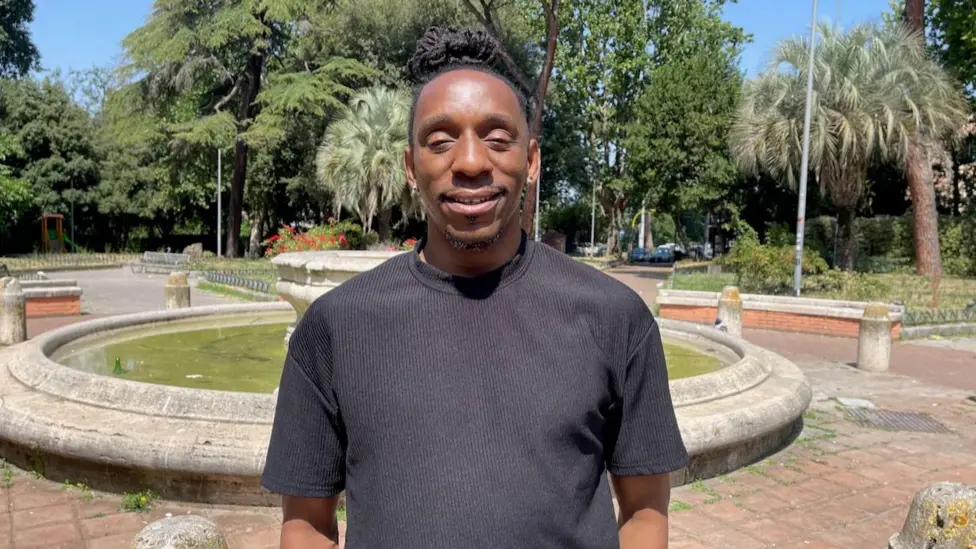Schmittian Moments 2


'Sonny Olumati was born in Rome and has lived in Italy all his life but the country he calls home does not recognise him as its own.To Italy, Sonny is Nigerian, like his passport, and the 39-year-old is only welcome as long as his latest residence permit."I've been born here. I will live here. I will die here," the dancer and activist tells me in what he calls "macaroni" Italian-English beneath the palm trees of a scruffy Roman park."But not having citizenship is like... being rejected from your country. And I don't think this is a feeling we should have".'
(Sarah Rainsford BBC Europe correspondent Reporting from Rome :Published
The Italian government’s handling of the citizenship referendum, as detailed in the article about Sonny Olumati and others excluded from the national community, provides a powerful contemporary illustration of Carl Schmitt’s ideas about sovereignty, order, and political identity.
For Schmitt, the core of the political lies in the sovereign’s ability to define who belongs and who does not, who is a friend and who is an enemy. Sovereignty is not just legal authority, but the power to decide on the exception: to draw boundaries around the community and to affirm who counts as part of its political order. The Italian case starkly illustrates this. Sonny was born in Rome, has lived in Italy his entire life, contributes culturally and economically, but is denied the legal and symbolic status of citizenship. His exclusion is not accidental; it is a political act that affirms a vision of Italy as a homogeneous ethnocultural order rather than a civic one. It is precisely this drawing of an inside and outside that Schmitt identifies as the essence of politics.
Giorgia Meloni's refusal to endorse or even meaningfully engage with the citizenship referendum aligns neatly with Schmitt’s conception of the sovereign as one who preserves the existential unity of the people by deciding when and how political boundaries must be drawn. Her dismissal of the referendum as unnecessary and her strategic silence, encouraging citizens to abstain rather than participate, functions as a sovereign gesture of containment. It avoids direct confrontation while reinforcing the idea that the current legal-political order is settled, legitimate, and in no need of revision. The refusal to allow people like Sonny or Insaf to access political subjectivity is not an oversight; it is a decision to define Italian identity through exclusion.
Furthermore, the rhetorical claim by Meloni and her allies that easing access to citizenship would “erase Italian identity” or “sell off our citizenship” invokes what Schmitt called a political theology of order. The state is imagined not as a neutral administrative apparatus but as the guardian of an organic, sacred cultural-political essence. Citizenship, in this view, is not a legal status to be extended based on residency, labor, or shared life, but a marker of metaphysical belonging. This fits with Schmitt’s critique of liberalism, which he saw as reducing politics to procedure, thereby evacuating it of existential substance. The Italian right resists liberal universalism in favor of an identitarian vision where being Italian is not earned through contribution but inherited through blood, history, and myth.
Meloni’s claim that the current citizenship regime is already “very open” is belied by the figures: many of those granted citizenship are descendants of Italians living abroad, Argentinians with Italian ancestry, rather than people like Sonny and Insaf who have lived in Italy for decades. This signals a cultural rather than civic definition of the nation, one that prioritizes ethno-historical continuity over contemporary presence and participation. It also reinforces Schmitt’s view that culture, like law, serves the political order rather than operating autonomously. Cultural belonging becomes a pre-political criterion for legal inclusion, not a result of shared life within a political community.Even the mechanics of the referendum reinforce Schmitt’s emphasis on decision and exception. The requirement of a 50% turnout threshold creates a situation in which the mere technical legality of the vote masks a deeper sovereign logic: the state allows a legal process while simultaneously nullifying it through political apathy and strategic disengagement. Meloni’s abstention is not democratic neutrality, it is sovereign negation, a Schmittian gesture of choosing not to decide publicly, in order to decide silently.In this way, the Italian government’s approach to citizenship, identity, and legality under Meloni is fundamentally Schmittian. The state draws a line around the nation, defines itself against an internalized enemy (the migrant, the stranger, the racialized other), and wields legal and cultural tools to preserve an ordered homogeneity.
The refusal to recognize Sonny and others as Italian is not a mere bureaucratic oversight, it is a decision that affirms a specific political theology of who the Italian people are.This is the structure of friend and enemy, order and exception, that Schmitt sees as the foundation of the political. In contemporary Italy, it is not clothed in martial rhetoric, but in administrative delay, strategic silence, and identity politics. And for those like Sonny, it feels like what it is: a sovereign rejection.